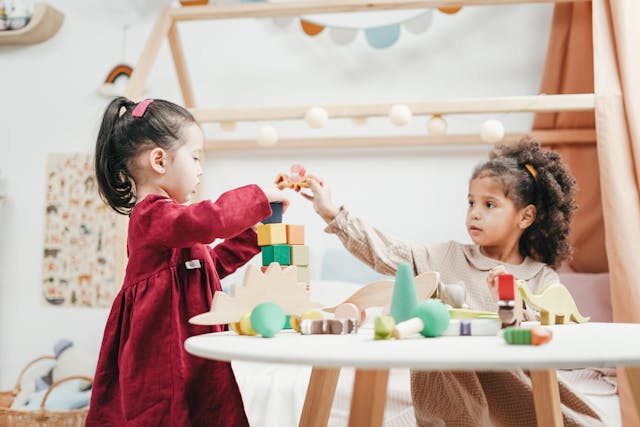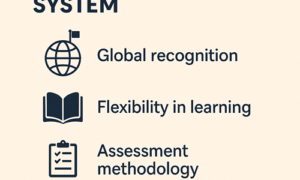
Daycare preschools are the path to forming a foundation for young children’s education. Apart from being a safe place for children who are at work, it lays the groundwork for early childhood education. A leading approach for early childhood education is the play-based curriculum.
This article will explore all of the reasons why play-based learning curriculums are amongst the most widely chosen by daycare preschools.
What is a Play-Based Curriculum?
The play-based curriculum revolves around using play to teach children effectively. This approach uses the fact that children learn best through learning. It focuses on hands-on experience, activities, and child-directed activities with teacher supervision.
Through these play-based activities, children develop the following skills:
- Cognitive skills
- Social skills
- Emotional skills
- Physical skills
This ensures that children experience holistic development, in all areas. It ensures children will experience a bright future and academic success and well-being.
Key Components of Play-Based Learning
1. Child-Led Exploration
With the help of play-based activities, children can follow their curiosity and interests. This guides them in their own learning experiences. Also, these activities can engage a child’s senses, giving a full round experience.
2. Creativity & Exploration
Using educational materials and activity-based learning, children will develop creativity. This quality is the starting point for children to develop creative thinking skills and ability for self-expression.
3. Rich Learning Environments
Preschool owners and teachers can collaborate to ensure the learning environment favors children. Using educational resources suitable for preschool children will help them learn better.
Learning spaces should have diverse open-ended materials that incite children’s curiosity. This includes building blocks, natural elements, and early numeracy and literacy aids. Also, outdoor play sessions are also useful under teacher supervision.
4. Socialisation
The incorporation of playing activities for learning purposes also allows children to interact effectively with each other. Children learn to share, take turns, and resolve conflicts through this interaction.
Socialization helps children develop social and emotional skills. It also helps them build relationships and find their place in society.
Benefits of Play-Based Curriculum in Daycare Preschool
1. Holistic Development
Holistic development means development in all areas: cognitive, physical, social, and emotional. Parents look for their children to develop in all facets, and play-based learning facilitates this.
Deeper immersion in play-based activity helps children to not only develop skills, they get to hone them as well. The incorporation of play-based learning ensures that children will grow and thrive.
2. Better Long-Term Learning Outcomes
Children who have early engagement with play-based learning have been shown to have stronger problem-solving skills, enhanced social behavior, and academic performance.
All of these qualities are known to help children throughout their education. It can also help them have a better life. During later years of education, these skills will be very helpful and children will be able to have a better educational experience.
3. Improved Learning Experiences
Play-based learning helps teachers teach complex concepts in a way children best understand. Not only this, they can make their lessons fun as well. This keeps children wanting to learn and attend daycare preschool.
Adding educational objects to the activities makes the play activities meaningful and impactful. Children gain a deeper understanding and a higher ability to retain concepts.
4. Emotional Regulation
Through group activities involving playing, children learn to develop their emotions. This is possible as they can express a range of emotions. Teachers act as a support for them by helping them navigate their emotions.
Also, role-based playing helps expose children to new scenarios. This will help children to understand how to manage their emotions in such situations in the real world. Of course, this helps children to be prepared for anything as they grow.
5. Balance Between Child-Directed & Teacher-Directed Activities
Play-based learning allows children to take the lead in certain cases. Children need to take the lead as it often leads to their natural way of learning. At the same time, teachers can also arrange for activities they direct.
This helps to create a balance between child-directed and teacher-directed activities. Together, teachers and children can help each other to develop a successful play-based approach to learning.
6. Love for Learning
A positive attitude towards education can help children develop a love for learning. Preschool children have a long educational journey. Ensuring they have a positive attitude to learning early on is important.
Play-based learning helps children to develop a love for learning. This will help build positive learning experiences that children will look forward to.
The adoption of the play-based curriculum has countless benefits for children and preschool teachers. It results in highly effective learning in which children experience fun while learning.
Children will develop a love for learning that will lead to better learning throughout their education.
Conclusion
A play-based learning curriculum is rapidly becoming a chosen approach by many daycare preschool owners. This is because play is the natural way that children learn effectively. It provides the ability to learn through hands-on experiences.
Educators can embrace this natural curiosity of children to provide an engaging and successful early childhood education. This will result in effective preschool programs as well as the next generation of learners who love to learn!






